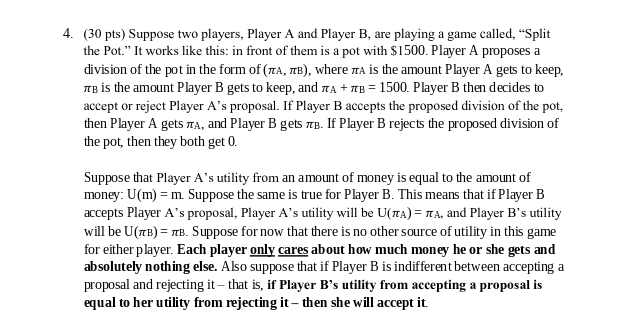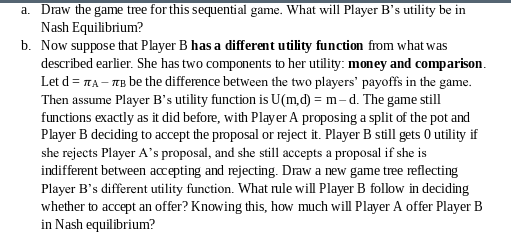

4. (30 pts) Suppose two players, Player A and Player B, are playing a game called, "Split the Pot." It works like this: in front of them is a pot with $1500. Player A proposes a division of the pot in the form of (TTA, TTB), where A is the amount Player A gets to keep, Tag is the amount Player B gets to keep, and AA + B = 1500. Player B then decides to accept or reject Player A's proposal. If Player B accepts the proposed division of the pot, then Player A gets TA, and Player B gets me. If Player B rejects the proposed division of the pot, then they both get 0. Suppose that Player A's utility from an amount of money is equal to the amount of money: U(m) = m Suppose the same is true for Player B. This means that if Player B accepts Player A's proposal, Player A's utility will be U(TTA)= TIA, and Player B's utility will be U(T) = TB. Suppose for now that there is no other source of utility in this game for either player. Each player only cares about how much money he or she gets and absolutely nothing else. Also suppose that if Player B is indifferent between accepting a proposal and rejecting it, that is, if Player B's utility from accepting a proposal is equal to her utility from rejecting it - then she will accept it. a. Draw the game tree for this sequential game. What will Player B's utility be in Nash Equilibrium? b. Now suppose that Player B has a different utility function from what was described earlier. She has two components to her utility: money and comparison. Let d = 1A - og be the difference between the two players' payoffs in the game. Then assume Player B's utility function is U(m,d) = m-d. The game still functions exactly as it did before, with Player A proposing a split of the pot and Player B deciding to accept the proposal or reject it. Player B still gets 0 utility if she rejects Player A's proposal, and she still accepts a proposal if she is indifferent between accepting and rejecting. Draw a new game tree reflecting Player B's different utility function. What rule will Player B follow in deciding whether to accept an offer? Knowing this, how much will Player A offer Player B in Nash equilibrium? 4. (30 pts) Suppose two players, Player A and Player B, are playing a game called, "Split the Pot." It works like this: in front of them is a pot with $1500. Player A proposes a division of the pot in the form of (TTA, TTB), where A is the amount Player A gets to keep, Tag is the amount Player B gets to keep, and AA + B = 1500. Player B then decides to accept or reject Player A's proposal. If Player B accepts the proposed division of the pot, then Player A gets TA, and Player B gets me. If Player B rejects the proposed division of the pot, then they both get 0. Suppose that Player A's utility from an amount of money is equal to the amount of money: U(m) = m Suppose the same is true for Player B. This means that if Player B accepts Player A's proposal, Player A's utility will be U(TTA)= TIA, and Player B's utility will be U(T) = TB. Suppose for now that there is no other source of utility in this game for either player. Each player only cares about how much money he or she gets and absolutely nothing else. Also suppose that if Player B is indifferent between accepting a proposal and rejecting it, that is, if Player B's utility from accepting a proposal is equal to her utility from rejecting it - then she will accept it. a. Draw the game tree for this sequential game. What will Player B's utility be in Nash Equilibrium? b. Now suppose that Player B has a different utility function from what was described earlier. She has two components to her utility: money and comparison. Let d = 1A - og be the difference between the two players' payoffs in the game. Then assume Player B's utility function is U(m,d) = m-d. The game still functions exactly as it did before, with Player A proposing a split of the pot and Player B deciding to accept the proposal or reject it. Player B still gets 0 utility if she rejects Player A's proposal, and she still accepts a proposal if she is indifferent between accepting and rejecting. Draw a new game tree reflecting Player B's different utility function. What rule will Player B follow in deciding whether to accept an offer? Knowing this, how much will Player A offer Player B in Nash equilibrium








